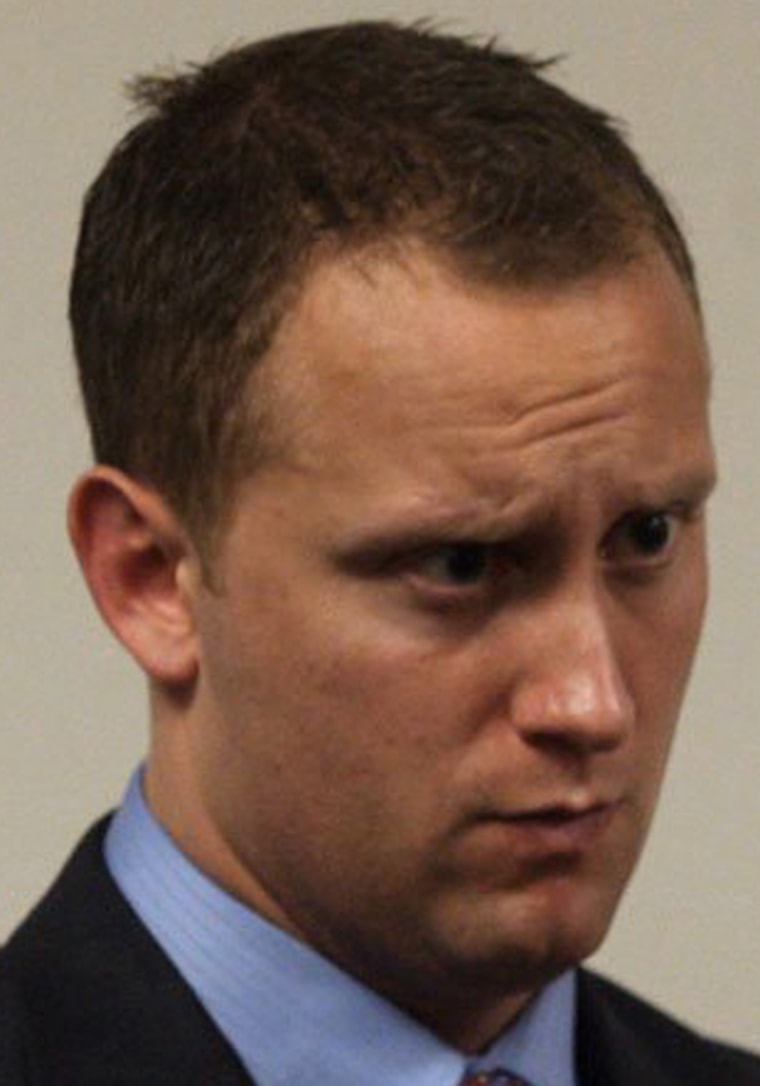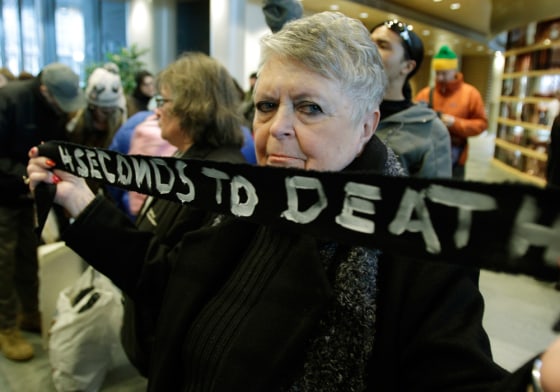A Seattle police officer who fatally shot a Native American woodcarver on a downtown street resigned Wednesday after prosecutors said no charges would be filed against him.
Birk, 27, shot knife-toting John T. Williams on Aug. 30 seconds after he crossed a street in front of a patrol car.
Police have released Firearms Review Board findings that say the shooting was unjustified.
The decision not to charge Birk has prompted an outcry from Williams' family and supporters, who demonstrated Wednesday outside City Hall, the Seattle Times reported.
Also, about 200 people marched through downtown Seattle streets Wednesday night, NBC station KING reported. No violence was reported but traffic was disrupted as many protesters lay down in the street before marching on to a Seattle Police Department precinct.
Birk has been on paid leave since the shooting. His badge and gun were taken from him after a hearing in October.
The fatal shooting stoked tensions between the city's police and minorities.
King County Prosecutor Dan Satterberg said there was insufficient evidence to prove criminal intent or malice as required to prosecute a police officer for homicide under Washington state law.

The shooting was a "good faith mistake, however tragic" and no charges would be filed, Satterberg said.
Birk faces other disciplinary action, Police Chief John Diaz said.
"The completion of this investigation is not contingent on Ian Birk remaining on the force," Diaz said. "Reaching our own administrative conclusion is a necessary step to providing a small degree of closure to the many people affected by this tragedy over the past several months."
Rita Williams, the victim's sister in Vernon, B.C., told the Times Birk's resignation was no comfort for the family.
"He still killed my brother. He basically got away with murder," she said. "If I shot anyone in the police station they would have all hung me by now. We should all go back to the olden ways, when he would have to pay for what he had done."
Williams' brother, Rick Williams, told KOMO Radio he was not surprised.
"I kind of expected all this because of the way the system is," he said. He said Williams was a First Nation woodcarver from a family that has represented Seattle honorably for generations. He complained that Birk had been glorified.
The police firearms review board found that Williams, 50, though intoxicated at the time, posed no threat "of serious harm" to the officer.
Birk has insisted he believed Williams was armed and that he shot the man in self defense. A knife with the blade folded closed was found next to Williams after the shooting.
Satterberg said he found several aspects of Birk's conduct troubling, including the officer's failure to call for backup, to take cover or to keep a safe distance from the victim.
However, "A jury would be compelled to find Officer Birk not guilty," he told reporters in announcing his decision not to bring charges.
"Washington law directs that police officers who use deadly force when confronting an armed suspect shall not be prosecuted for any crime, as long as they are acting in good faith and without malice."
The fatal shooting was one of several recent confrontations between Seattle police and ethnic or racial minorities cited by the American Civil Liberties Union in asking the U.S. Department of Justice to launch an investigation.
A Justice Department spokeswoman in Washington said on Wednesday that the agency has opened a preliminary review into whether there was a "pattern and practice of misconduct" by Seattle police, including allegations of excessive force.
Immediately following Satterberg's remarks, Diaz announced separately that a firearms review board had ruled the shooting unjustified and concluded that Birk had failed to properly identify himself as a police officer to Williams.
"It was not necessary," Diaz said of the shooting, adding that Birk's "decision to use deadly force did not conform to policy" and was contrary to police training.
The review board recommended Birk be stripped of his badge and his gun and never work as a police officer again.
Satterberg said the shooting sparked a "deep divide" between police and "some members of our community."
"There is suspicion, mistrust and even fear that minority members ... will be mistreated by the police," he said.
A number of Native American residents attending a news conference by Mayor Mike McGinn complained they felt a sense of lawlessness and lack of control over the police department.
McGinn said he was "committed to restoring and rebuilding trust in the community."
